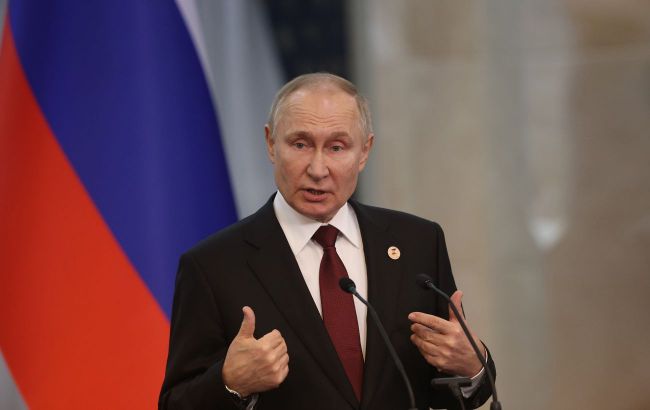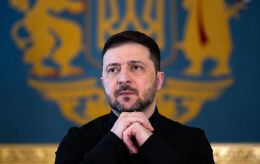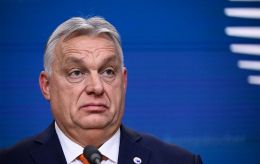What awaits Russia during Putin's new presidency: 5 possible scenarios
 Russian dictator Vladimir Putin (photo: Getty Images)
Russian dictator Vladimir Putin (photo: Getty Images)
Russia is holding so-called "presidential elections" that are likely to be won by dictator Vladimir Putin. Politico has predicted what might happen during his new "cadence," which will last until at least 2030.
No one can say for sure what the Russian dictator's repeated victory in this year's elections portends. But what is clear is that the war in Ukraine has helped make Russia's internal situation more unstable than it has been in decades, and all sorts of potential future scenarios are no longer unthinkable.
The newspaper has prepared five scenarios that Russia could face by the end of Putin's next term in 2030.
Scenario one
The media outlet notes that the first scenario is based on the flourishing of democracy in Russia, and its probability varies between 5-10%.
As the anti-communist and anti-colonial revolutions of 1989 in Eastern Europe showed, totalitarian regimes can rest on quicksand and quickly collapse in the face of democratic movements.
Putin's disastrous decisions in Ukraine have already had unintended consequences that will only generate further discontent and greater interest in potential alternatives, including direct democracy.
Scenario two
In the second scenario, according to the newspaper, there is a 10-15% chance that Russia could simply disintegrate.
Politico explains that against the backdrop of a devastating war in which hundreds of thousands of Moscow soldiers died in a pointless struggle, Russians are protesting en masse and overthrowing an aging, doddering regime.
"Long-buried frictions and frustrations ripple across the country and a nation supposedly united under the steady hand of Moscow suddenly splinters along ethnonationalist lines. Chaos sprints across the nation, which collapses into a mixture of anarchy, territorial fragmentation, and violence that leaves no region, and no family, untouched," the media writes.
Scenario three
The probability of the third scenario, according to the media, is already rising to 15-20%, and the scenario itself is based on the idea of Russian nationalists becoming more active.
Just a year ago, the idea that renegade militias led by a fierce nationalist could almost march on Moscow, forcing Russian officials to take cover, was fantastic.
And then, last June, the head of the militia, Yevgeny Prigozhin, did just that. And although Prigozhin's Wagner PMC never reached Moscow, it was not for lack of trying; on the contrary, the path was wide open. If Prigozhin achieved anything, it was to make Putin look like a naked king.
For these reasons, this scenario seems to be one of the most likely for post-Putin Russia. The flames of nationalism, ignited by Putin, are unlikely to subside anytime soon.
Scenario four
Technocratic reset is the name Politico gave to the fourth scenario after Putin's re-election. This scenario has an estimated 20-25% probability.
The media noted that two years have passed since Moscow's failed invasion of Ukraine, and its consequences for Russia are already evident.
These costs, whether in the form of a sagging economy or a spiraling death toll, will continue to accumulate. That is why the idea that the inner circle of Kremlin officials will meet with Putin and tell him that they appreciate his service and wish him all the best in retirement - in other words, a repeat of the situation with Nikita Khrushchev's resignation in 1964 - is a scenario that will only become more likely as time goes on.
According to the article, there is now a high probability that a new regime will emerge in Russia by 2030.
Scenario five
The most likely scenario for the development of events in Russia after the re-election of the Russian dictator to the presidency, with a probability of 45-50%, was called "Long Live President Putin."
"With the death of Navalny, the democratic opposition is in shambles. The Russian economy, despite a barrage of Western sanctions, has hardly collapsed, even if it’s turned sluggish. Although Putin hasn’t conquered Kyiv, the worst of the Ukrainian war may yet be behind him, especially given the U.S.’s reticence to arm Ukraine. And compared to American presidents, at just 71, Putin’s still got (relative) youth on his side," states Politico.
Pseudo-elections in Russia
The so-called "presidential elections" in Russia will last three days, from March 15 to 17, 2024.
Russian dictator Vladimir Putin will be able to remain in power until at least 2030. Moreover, Kremlin spokesperson Dmitry Peskov has already stated that Putin will be re-elected with 90% of the vote.
The Defense Ministry's Defense Intelligence reports that the Kremlin is collecting votes for dictator Putin even among "dead souls" - Russian invaders who died in the war against Ukraine.
RBC-Ukraine's sources in the special services reported that the online voting system for the so-called "elections" in Russia has failed. This is the work of cyber specialists of the Defense Intelligence of the Ministry of Defense.
At the same time, more than 50 UN member states have condemned the pseudo-elections held by Russia in the occupied territories of Ukraine.

